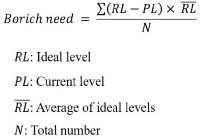
Purpose This study was designed to develop a curriculum for pre-service golf coaches at universities to enhance the coaches’ competencies to counsel athletes on the field. Methods This study was conducted in accordance with the revised and supplemented procedures for the national competency standard (NCS) based curriculum development outline under the level of application of individual instruction-level classes among the types of curriculum development. Results The results were as follows: First, the elements of the counseling competence were guided by conflict resolution counseling, psychological skills training, guidance counseling, coordination and Intervention, and relationship formation. Second, the curriculum was adopted as a curriculum for sports psychology, theory and practice of counseling, counseling practice and super-vision, and psychological skills training, and non-disciplinary activities were participation in group and personal counseling, and an open counseling case study. Third, the feasibility of the curriculum was calculated in the range of 0.8 to 1.0 for all areas to be reasonable. Conclusions The results of this study have structured the counseling competencies required for pre-service golf coaches. Based on this, the results of the study suggest counseling courses in the curriculum of university. This is expected to ultimately seek to improve the coaching field by enhancing the capacity of the coaches.



PURPOSE This study analyzed the relationship among coaching behaviors, motivational climate, sports competence, effort, and failure tolerance as perceived by high school athletes. Additionally, it examined whether motivational climate, competence, and effort mediate the relationship between coaching behaviors and failure tolerance. METHODS Using questionnaires measuring autonomy-supportive coaching behavior, controlling coaching behavior, motivational climate, sports competence, effort, and failure tolerance, 365 high school athletes were surveyed. Using SPSS 28.0 and Amos 28.0 software, descriptive statistics and structural equation modeling were conducted along with the following types of analyses: reliability, correlation, confirmatory factor, convergent validity, and discriminant. Additionally, the bootstrap method was used to verify serial multiple mediating effects. RESULTS Autonomy-supportive behavior had a significant positive effect 1) on motivational climate, sports competence, and effort and 2) on failure tolerance. 3) Controlling coaching behavior had a significant negative effect on motivational climate and sports competence. 4) Motivational climate and 5) sports competence both had a significant positive effect on effort. 6) Effort had a significant positive effect on failure tolerance. Last, in the relationship between autonomy-supportive behavior and failure tolerance, motivational climate, sports competence, and effort showed partial mediating effects. CONCLUSIONS This study confirms the importance of coaches’ autonomy-supportive behavior in determining failure tolerance among adolescent athletes. Based on this information, counseling (educational) programs aimed at enhancing performance can be developed and provided in sports settings, thus fostering success among athletes.